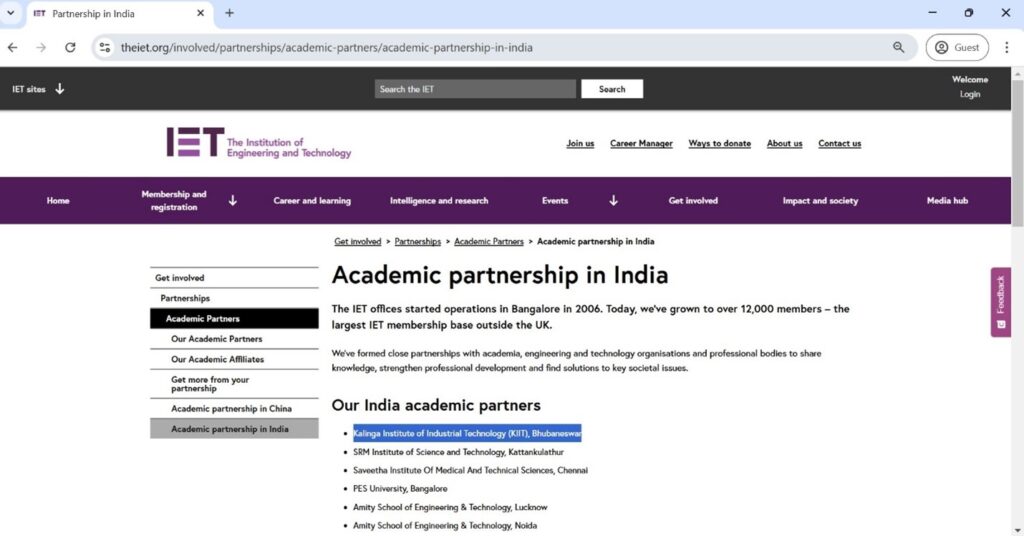Stakeholders’ Engagement
A Stakeholders’ Engagement Policy in a university outlines the institution’s commitment to fostering meaningful and productive relationships with various stakeholders, including students, faculty, staff, alumni, local communities, government agencies, and other interested parties. Such a policy helps ensure that the university maintains open lines of communication, transparency, and collaboration with its stakeholders. By adopting and implementing a comprehensive Stakeholders’ Engagement Policy, a university can demonstrate its dedication to building strong, transparent, and mutually beneficial relationships with its diverse stakeholders, ultimately contributing to its overall success and positive impact on the community it serves.
Stakeholders’ Engagement Policy
Objective: To engage and collaborate with stakeholders internal and external to the University to achieve its mission and achieve eminence as an Institute of Higher Education in the global platform.
Stakeholders: The University has identified stakeholders internal and external to the University as given below:
- a) Internal Stakeholders:Continuing Students, Graduates, Scholars, Researchers, Faculty members, Staff members, Parents.
- b) External Stakeholders:Alumni, Employers, International and National Accreditation Agencies, Statutory Bodies, Embassies, collaborating Universities, industry and research organizations, regional institutes and industries, non-governmental organizations, local and national Government, community around the University.
Types of Engagement:
a) Engagement with Internal Stakeholders:
Feedback to be collected annually from internal stakeholders on the curriculum, teaching–learning process, research, tutor-mentoring, resources available, infrastructure, and hospitality. In this regard, they can be also involved in suggesting curriculum revisions and providing quantitative and qualitative feedback that will contribute indirectly to the Program Outcome attainments for different programs and identify revision in program educational objectives maintaining consistency with the curriculum, program outcomes and program specific outcomes for different programs. The University has a decentralized, transparent and participative governance system. The internal stakeholders can also be invited as members of different committees and decision-making bodies like the Program Assessment Committees, Board of Studies, Academic Council, etc.
b) Engagement with External Stakeholders:
The Internal Quality Assurance Cell will keep the University updated regarding the requirements and policy changes from the side of the statutory bodies, international and national accreditation bodies and recommends necessary changes and updates required in the curriculum, assessment processes, expected graduation outcomes, governance changes and student affairs.
The University Industry Engagement Cell (IEC) will liaison with the employers and recruiters and obtain necessary feedback on the students’ performance in the recruitment rounds, and feedback for curriculum changes. They will also be invited to become members of different internal committees and decision-making bodies of the University.
The University Alumni cell will liaise with the KIIT alumni over multiple platforms and obtain necessary feedback on curriculum changes, new industry collaborations, create job opportunities and obtain approval for capstone projects through industries. They can be invited to participate in providing their feedback for computing program outcome attainment, program educational objective attainment and requirements for revision in program educational objective. They will also be invited to become members of different internal committees and decision-making bodies of the University.
The International Relations Office (IRO) of the University will liaison with the Embassies and keep the University updated on the skill requirements in different countries, programs in demand for those countries and regulations for pursuing higher studies outside their country.
The University will liaison with universities, research institutes and corporate organizations to actively engage in academic and research pursuits to improve the international outlook and achieve eminence in the global platform. These pursuits will continue with the active involvement of the different Schools of the University and the progress is monitored by the Office of the Vice Chancellor.
The University will engage and collaborate with regional institutions to help them prepare relevant curriculum and pedagogy as well as prepare for national and international accreditation.
The University will engage with local industries to study their processes and products and propose cost effective solutions for innovative products, as a contribution towards the ‘Make-in-India’ mission.
The University will also engage with the local NGOs, the Government and communities around the University and the state and work towards realizing targets set for the UN Sustainable Development Goals.
More details on the Stakeholders’ Engagement Policy are provided in the below link
https://kiit.ac.in/policies/stakeholder-engagement-policy/
- Monitoring the Engagement and Outcomes:
The engagement with different stakeholders and associated outcomes is monitored by the Office of the Vice Chancellor of the University on a periodic basis to frame strategies for continuous improvement.
- Procedure for Engagement with External Stakeholders
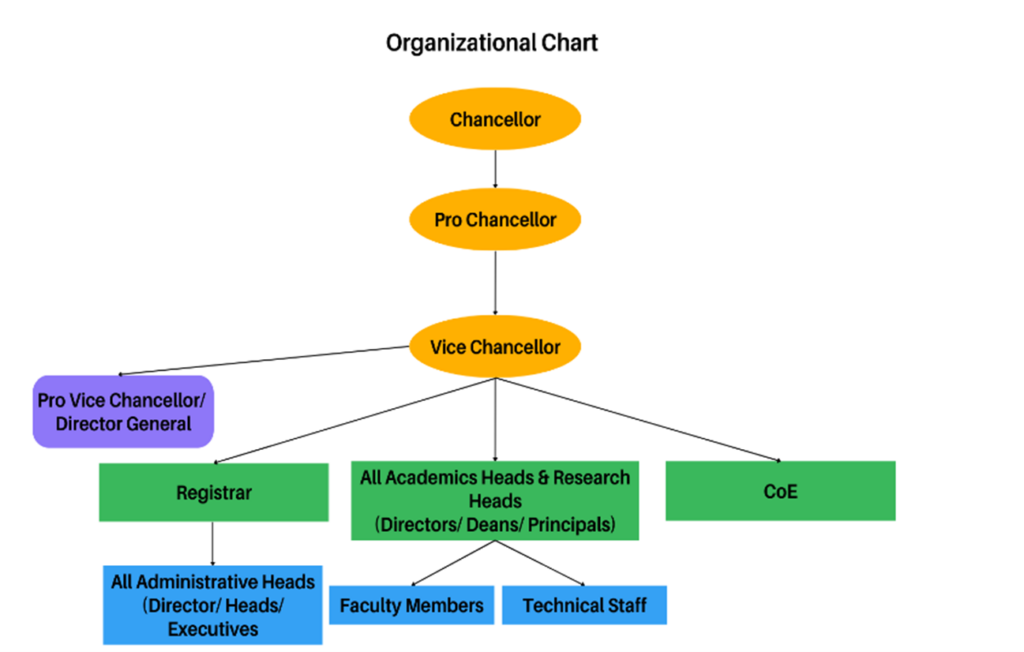
External stakeholders like Students, alumni, parents and employers in major decision-making bodies of the University and in its Governance. Well defined policies and procedures for national and international collaborations with academia, research organizations and industries for academic and research collaboration have resulted in Memorandum of Understandings. This has led to faculty and student exchange programs, collaborative research, well defined and updated curriculum and courses catering to issues of national and international relevance, internship opportunities for students and collaborative faculty development programs.
The University has a strong governance system as approved by the University Grants Council (India), which is the chief authorizing agency for the University.
The University appoints industry personnel and other local stakeholders as external members of in its major decision-making bodies as part of its policies and procedures. These bodies include:
- Board of studies of each school which investigates curriculum revision and update for different undergraduate and postgraduate courses and programs running in the schools.
- The Academic council which is the premier academic body of the University to decide on academic matters.
- The Board of Management of the University which is the apex governing body of the organization has representations of stakeholders from outside.
- The Internal Quality Assurance Cell acting as a nodal unit for reviewing the institutional academic policies and practices and augments quality related activities.
- The Industrial Advisory Board comprising industry professional from small to large scale corporations who are involved in revising and evaluating Program Educational Objectives, advising on curriculum update from time to time and facilitate collaborations and partnerships with the industry.
- The Academic Audit, administrative audit and financial audit are being carried out with professionals and experts invited by the University authorities.
- Additionally, all stakeholders including the alumni, parents, reputed academicians, representatives from industry and employers are involved in providing feedback on the curriculum, framing of course/student outcomes and program educational objectives.
- Further, external members from academic and industry are part of the panels for evaluation of research thesis and technical projects being conducted in the University.
Industry Engagement Cell
The Industry Engagement Cell (IEC) at the University has been established with the vision to create and nurture an enduring and sustainable environment to foster and maintain a symbiotic relationship with the industry and other external agencies that is mutually beneficial and value-adding. The overall vision is to create and sustain a positive impact on the Corporate World and other organizations of repute at National and International levels, primarily in the space of academic excellence and enhancing the overall knowledge ecology at the University. To start with, IEC has been constituted with faculty drawn from the Schools of Engineering and School of Management. They are entrusted with the five major activities:
- First is to encourage the researchers within the university to develop strong ties with the Industry, Government / Non-Government Organizations and associated Community Groups with the purpose of collaborating on new research frontiers and creating commercial opportunities in form of Intellectual Property (IP).
- Second is to develop the state-of-art laboratories at the University for experimentation and knowledge incubation by corporate support including conducting project-based training and certification of students, arranging sponsored research consultancy, organizing technical lectures by SME’s (Subject Matter Experts) and workshops / symposiums based on current industry requirements.
- Third is to explore the possible opportunities for Leadership/Executive Development Programs and/or customized learning programs in selected areas of specialization to leverage from the expertise resident with the University faculty as well as with the assistance of the corporate.
- To augment the efforts of IEC in the area of technical training and global certification of students, a “Certification School” has been established at the University. The main aim is to provide the technical training and certifications to all students and interested faculty as per the current industry requirements. For this, few academic initiatives with the global leaders have been established and some of them are Microsoft IT Academy, Microsoft Edvantage Platinum, Cisco Network Academy, D-Link Network Academy, Red Hat Academy, IBM Academic Initiative, VMWare Academy, Oracle WDP, Adobe India Academy, Microsoft Dynamic NAV Academy, Unisys Innovation Lab (UIL), Nokia Centre of Excellence, Siemens Centre of Excellence, Dassault System Centre of Excellence, Ericsson Talent Building Program, Tech Mahindra IT IMS, IoT Centre of Excellence etc.
- The University also provides Industry-oriented courses within its regular curriculum as electives in collaboration with industry as well-defined policies in curriculum revision. Example:
- Media and Applications
- Cloud Computing
University Entrepreneur Cell, Training Placement Cell and Career Advisory & Augmentation Services are working for different activities towards industry engagement. Training Placement Cell and Career Advisory & Augmentation Services.
The more details are available in the following link:
https://filedata.kiit.ac.in/tbi/Entrepreneurship-Cell.pdf
https://kiit.ac.in/training-placement/training-placement-contact/
Community Engagement Cell
Community Engagement Cell (CEC) has been constituted to organize different outreach programmes by involving the students, staffs and general public. The Community Engagement cell is headed by Dy. Director- Community Engagement Cell. More details on community engagement cell and its’ activities are provided in below link.
https://kiit.ac.in/community-engagement/
Roles and Responsibilities of the Cell are:
- To assist during prestigious/ mega function at the University
- To facilitate the students at the University to perform outreach activities
- Motivate the students to involve in different outreach activities
- Conducting the awareness programmes
- Coordinate all types of social outreach activities including Art of Giving and Kanya Kiran of the University
- Facilitate the NSS wing of the University
- Conducting counselling session and developing short programmes to provide platform to the students to involve themselves in different social activities to inculcate sense of social responsibility
- To assist any other assignment given from time to time.
Stakeholders Engagement Model
Alumni Engagement in University’s Governance
Alumni, with their unique position as former students turned stakeholders, play a crucial role in university governance through the feedback they provide. Their experiences during their academic journey and in the years that follow graduation offer a perspective that is both informed and deeply insightful. The impact of alumni feedback can be seen across various facets of KIIT University governance. One of the foremost areas where alumni feedback is instrumental in ensuring and enhancing the quality assurance and improvement of education. Alumni, having applied their education in real-world contexts, offer valuable feedback on the relevance of their education to their careers. Engaged and satisfied alumni become strong advocates for their alma mater. KIIT University responds to and act upon alumni feedback to create sense of loyalty and pride among graduates. Alumni engagement fosters a sense of community that extends beyond graduation. Alumni feedback is an integral part of KIIT University’s governance, collected annually at the end of the academic session. The questionnaire designed for our valued alumni seeks their insights into various aspects of their education and the skills they have gained throughout their academic journey. Questions cover a wide spectrum of competencies, ranging from academic proficiency in mathematics and basic sciences to the ability to integrate knowledge for solving complex problems and design systems. Alumni are also asked to assess their skills in areas like conducting experiments, analyzing data, and using modern engineering and IT tools. Moreover, they share their perspectives on the societal, legal, and environmental implications of engineering solutions and their readiness to face upcoming challenges in their profession. Alumni feedback also delves into their commitment to sustainable development, professionalism, and ethical standards. In addition, it evaluates their comfort in working in a global environment, communication skills, ability to work in diverse teams, leadership skills, project management capabilities, and the belief in the importance of higher studies and lifelong learning. This valuable input guides us in continually improving our academic programs and ensuring that our graduates are well-equipped for a dynamic and evolving professional landscape. Alumni feedback is an indispensable asset in university governance. Their real-world experiences and insights influence decisions related to academic quality, curriculum relevance, career development, and institutional advancement. When universities harness the power of alumni feedback, they are better equipped to adapt, evolve, and excel, benefiting both current students and the broader academic community.
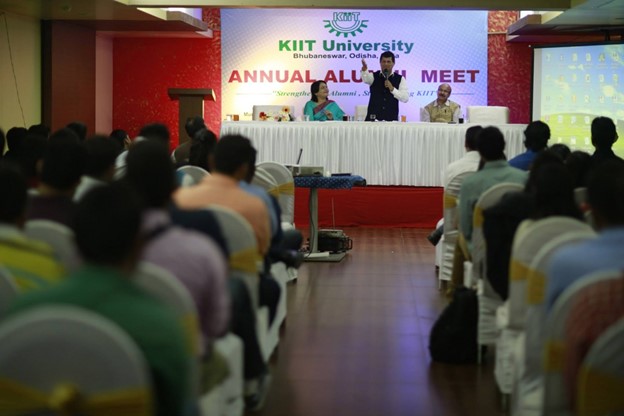 | 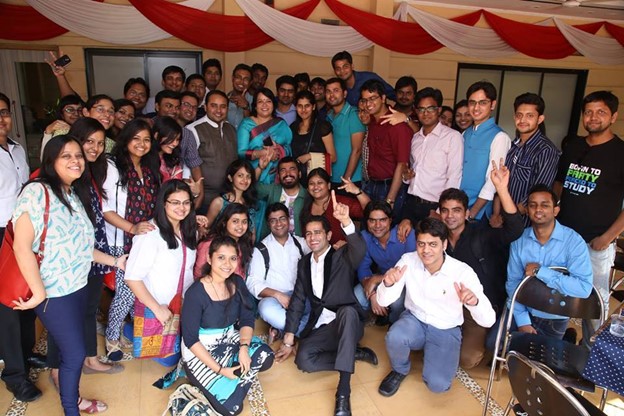 |
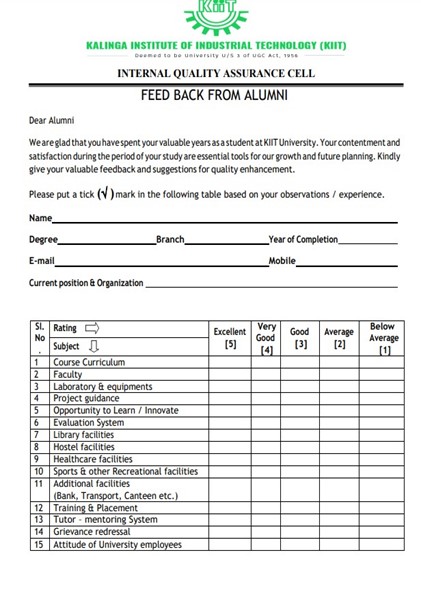 | 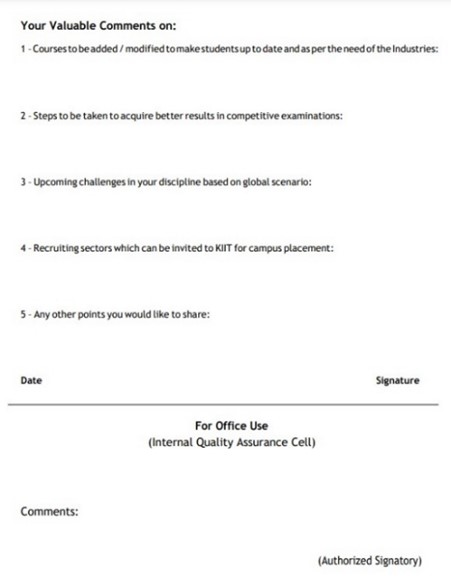 |
Parents Engagement in University’s Governance
Parents play a pivotal role in university governance through their feedback. Their insights are a valuable source of information that helps KIIT University to ensure the effectiveness and quality of the educational experience. Parents provide feedback on various aspects, including admission procedures, the teaching-learning process, faculty competence, mentoring systems, campus environment, infrastructure, and support services. Their assessments are crucial in evaluating the University’s commitment to providing a conducive learning environment.
The feedback from parents, collected annually at the end of the academic session, is a vital component of the KIIT University’s governance, ensuring that the educational experience we provide is enriched and well-rounded. The comprehensive questionnaire includes a spectrum of aspects that parents deeply care about. It encompasses the admission procedure. It extends to the teaching-learning process, evaluating the effectiveness of education and the competence and commitment of faculty members. Parents also assess the tutor-mentoring system, the overall environment and campus ambiance, the quality of infrastructure and learning resources, and the availability of healthcare, sports, games, and extracurricular activities. Support services such as hostels, transport, and canteens are scrutinized, and feedback is collected on training and placement opportunities, the timely publication of results, grievance redressal mechanisms, and the attitude of institute employees. Importantly, parents’ feedback reflects their sense of pride and respect for the KIIT University, providing valuable insights that guide the governance and ensure that KIIT continue to meet the expectations of both students and their families.
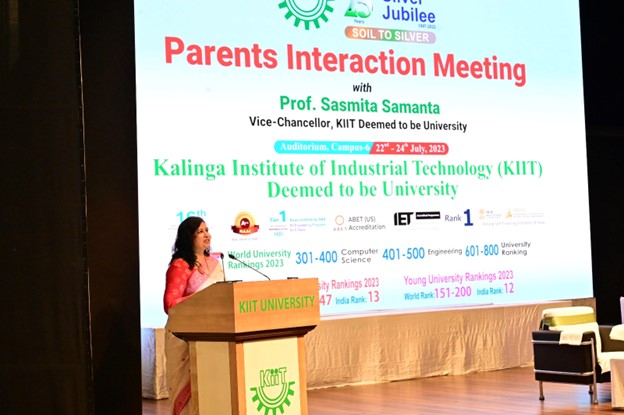 | 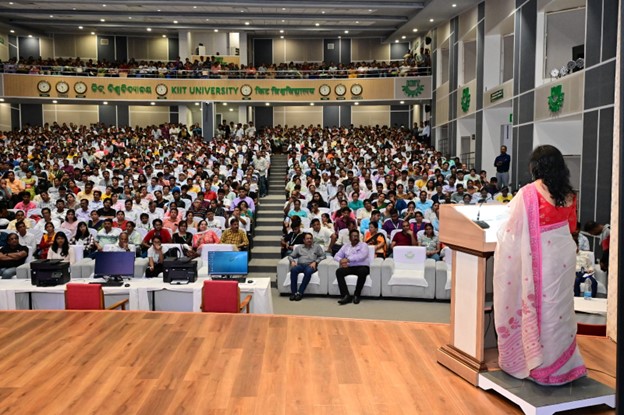 |
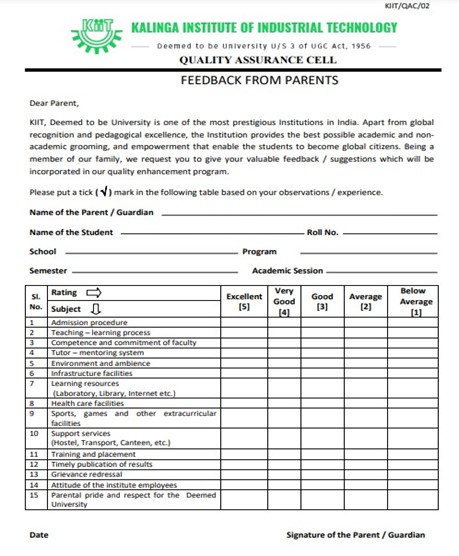 |  |
Employer’s Engagement in University’s Governance
Employer’s, as prominent stakeholders in the academic world, hold a vital role in university governance through their feedback. Their insights and evaluations of graduates’ readiness for the workforce provide valuable guidance to educational institutions. Their feedback is a mirror reflecting the alignment of education with industry needs, and it fosters a symbiotic relationship between academia and the job market. By actively participating in the governance process, Employer’s help universities adapt and thrive in a rapidly changing professional landscape, benefiting both current students and the broader academic community.
The collection of feedback from employers at the end of the academic session plays a crucial role in KIIT university’s governance, ensuring that the education we provide is in alignment with the demands of the professional world. The comprehensive questionnaire, thoughtfully designed to capture employers’ assessments, covers a spectrum of key competencies and factors. These include technical knowledge and skills, which reflect the practical applicability of education; communication skills, vital in modern workplaces; and personal interest, innovativeness, and creativity, which are essential for addressing contemporary challenges.
Employers also evaluate qualities such as responsibility, reliability, and effectiveness as team members or leaders. Their feedback on how effectively students address workplace problems and contribute to organizational goals guides us in refining our curriculum and training methods. Moreover, insights on the attitude of KIIT University employees, hospitality, and logistic support complete the picture. This feedback is a compass, steering the KIIT’s policies to ensure that graduates are well-prepared for the workforce, and that our institution remains responsive to the ever-changing professional landscape.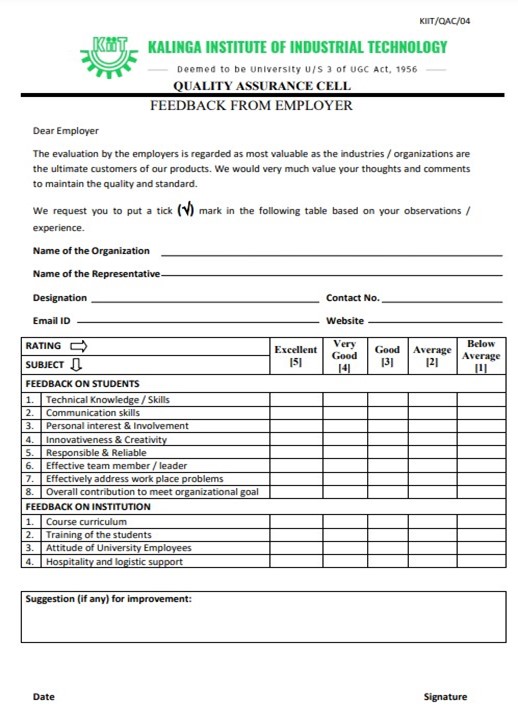
Internal Quality Assurance Cell
The University has internal quality assurance cell (IQAC) which monitors and assures the quality of teaching and learning of different academic programs, curriculum design, research methodology etc. It is composed of internal senior members and external stakeholders. The details are also available in the below link
Collaboration with Other Universities/Industries/Research Laboratories
Engagement through Academic and Research Partnership
The University is an academic affiliate with The Institution of Engineering and Technology (The IET, UK). Further the University is a member of various National and International bodies.
https://www.theiet.org/involved/partnerships/academic-partners/academic-partnership-in-india/
https://kiit.ac.in/about/global-footprint/
Along with the above, the University is working with the following institution in academic and research collaboration
research collaboration
- Chulalongkorn University, Thailand
- Nottingham Trent University, UK
- Taipei Economic and Cultural Center, Taiwan
- University of Cincinnati, USA
- University of Southampton, UK
- HTW Dresden University of Applied Sciences, Germany
- Mahidol University, Thailand
- Chaoyang University of Technology, Taiwan
- ENSEA, France
- Y Schools, France
- Alma Mater Europaea, Slovenia
- Ge4, France
- The George Washington University School of Business, USA
- The University of Kentucky, USA
- Korea Airtech College, South Korea
- Corporacion Unificada Nacional De Educacion Superior, Colombia
- Federacion De Municipios Del Litoral Pacifico Colombiano-Fedempacifico, Colombia
- Otani University, Kyoto, Japan
- College of AI Convergence, INJE University, Republic of Korea
- The George Washington University School of Business, USA
- The University of Kentucky, USA
- Bartin University, Turkey
- Humak University of Applied Sciences,, Finland
- The College Board, USA
- Massey University, New Zealand
- Vietnamese Embassy, Vietnam
- Sulu State College, Philippines
- Northern University, Bangladesh
- Samara University, Ethiopia
- Durban University of Technology, South Africa
- The Romanian – American University (RAU), Bucharest
- Free International University Of Moldova (ULIM), Moldova
- Trakia University, Stara Zagora, Bulgaria, Bulgaria
- Synergy University, Moscow, Russi, Russia
- Red Sea University, Somalia
- Rijeka University, Croatia, Croatia
- Makerere University, Uganda
Engagement with Stakeholders Through Various Consultancy Services
The Institute has expertise in various research areas to provide knowledge and intellectual inputs which are of interest to the industry and other organizations. Broad areas of consultancy services are:
- Construction Engineering
- Structural Designing
- Soil testing
- Software development
- Mechanical and automobile Engineering
- Electrical Engineering
- Management Development Programs
- Legal Consultancy on IPR, criminal law and cyber law
- Legal Aid
- SAP ABAP training and Certification
Engagement with Stakeholders Through Research Laboratories
The University has established a state-of-the-art Central Advanced Research Centre (CARC) on 1.2 lakh sq. ft. built up area for multidisciplinary research. Apart from these sophisticated central research facilities, specialized laboratories have been established some in collaboration with the industries and corporate bodies in various schools. They provide ideal platforms for conducting collaborative research and development work with several partnering agencies and institutions around the world. To promote innovation and startup entrepreneurship among students as well as in wider society, the University had opened Technology Business Incubator (KIIT-TBI) in 2008. KIIT-TBI is supported by Department of Science & Technology (DST) and National Science & Technology Entrepreneurship Development Board (NSTEDB), and scores of other agencies. KIIT-TBI has so far incubated over numerous business entities out of which 34 have graduated out to set up full-scale commercial enterprises.
The more details regarding KIIT-TBI and its’ collaboration, activities are provided in the below link
https://kiitincubator.in/overview/
https://sustainability.kiit.ac.in/wp-content/uploads/2024/11/KIIT-TBI_2023.pdfKIIT-TBI_2023
Engagement with Stakeholders Through Centre of Excellence
Several Centres of Excellence have been established in the University. Various stakeholders are engaged through these centre of excellence. The brief details and the relevant SDG for each centre of excellence are provided below.
Center of Excellence for Sustainability and Equity
- Working towards awareness of different SDGs, collaboration with National, International Government, NGOs and corporate to frame policies and decide on plan of action to meet the goals.
- Relevant SDG: SDG17
Tech Mahindra Design Laboratory
- Advanced training on automobile technology and projects for students and researchers.
- Relevant SDG: SDG 4
Siemens Laboratory
- The objective of this Center of Excellence is to impart project based training of PLM software tools for cutting edge technology enabled students.
- Relevant SDG: SDG 4
Center of Excellence in Translational Research Program on Gastrointestinal bacteria pathogens
- Conduct Advanced Research Program on Gastrointestinal bacteria pathogens.
- Relevant SDG: SDG 3
Center of Excellence in Translational Research Program on Gastrointestinal bacteria pathogens
- Conduct Advanced Research Program on Gastrointestinal bacteria pathogens.
- Relevant SDG: SDG 3
Center of Excellence for Rare Earth Materials
- Advanced research on the properties of rare earth materials available particularly in the state of Odisha, study of their characteristics and their potential use in industrial applications.
- Relevant SDG: SDG 4, SDG 9
KIIT-DU –Acer Center of Excellence
- Projects, automation and software based research and solutions around artificial intelligence and virtual reality are being carried out.
- Relevant SDG: SDG 9
Technology Enabling Center
- Capacity building for engineering/medicine & science students (of Odisha) to build innovative projects leading to new product & process development, IP & Tech transfer activities.
- Relevant SDG: SDG 4
Acer Predator Thronos at Design Thinking Lab
- helpful in learning and applying the concepts of AR/VR through coding and gamification
- Relevant SDG: SDG 4
Centre of Excellence in Leadership
- Vision to facilitate development of leadership skills and making global leaders
- Relevant SDG: SDG 8
Centre for Constitutional Law Studies and Research
- To promote awareness among students regarding the dynamics of Constitutional Law. The prime interest of the Centre lies in promoting the research activities in students in national and inter-college level. The Centre has succeeded in extending its work sphere to doctrinal researches and has also started to concentrate on publishing empirical reports.Its objective is to create a supportive environment for academic discussion and thought about constitutional matters. And to encourage students of all backgrounds to participate, regardless of their knowledge of the more nuanced aspects of the constitution.To provide a platform for public discourse and deliberation vis-a-vis Constitutional law. The Society endeavor through the course of its activities to promote awareness about the subject and its importance. The purpose behind the establishment of the Centre is to generate debate and dialogue on various nuances of the subject of Constitutional Law.
- Relevant SDG: SDG 17,SDG 16
Centre of Studies for Business and Corporate Law
- The Centre offered a platform to recommend discussions on company legal guidelines, and anatomize on exclusive subjects and additionally expand a hobby in corporate regulation subjects. It is an endeavor to sell the expertise and studies within side the discipline of the Business Law and is an initiative taken with the aid of using the School of Law, KIIT University to assist college students in addition to different stakeholders to evolve the modifications for private in addition to commercial growth. The Centre’s founding purpose is to analyze and examine the enterprise regulation paradigm, to gain that the Centre will behavior numerous sessions, seminars, meetings etc. over the length of time; creating an expertise of realistic elements of company and business legal guidelines amongst students that is going past the scope of school room teaching, which includes preserving the conventional technique of disseminating knowledge, breeding college students specializing in studies and concurrently imparting a breadth and intensity of records specially company legal guidelines and to convey together, from the practicing fields to construct a platform and to gain the top of perfection in corporate education.
- Relevant SDG: SDG 8, SDG 9, SDG 10, SDG 16
IBM Center of Excellence
- Working towards the development of software solutions related to student projects, and conducting training programs for students of the region for providing hands on trainings related to coding required in the IT industry thereby augmenting their employability.
- Relevant SDG: SDG 4, SDG10
Center of Excellence for Space Science
- Working on Geographical Information Systems with the help of space technology to identify issues in farmlands and undertake suitable endeavors. This is oriented to help the agricultural sector leading to economic growth and decent life for related stakeholders.
- Relevant SDG: SDG 8
Interdisciplinary Research Center in Materials and Nano-Sciences
- Advanced research in the domain of materials and nano-sciences are being carried out.
- Relevant SDG: SDG 9
Schneider Lab
- Focuses on automation system and smart energy management. This lab also gives a platform to have hands on experiences on emerging technologies and build skills of real world among students and researchers.
- Relevant SDG: SDG 4, SDG 9
Center of Excellence for Automotive Mechatronics
- Provides advanced diploma in advanced mechatronics creating skilled technicians for the automobile industry.
- Relevant SDG: SDG 4, SDG 10
Boeing Center
- Capacity Building for University students, faculty and early stage startups to transform plans into practical and possible business ventures with the capability to take the Indian aerospace and defense to the next level and help scale greater heights in future.
- Relevant SDG: SDG 9
Technology Transfer Office
- Building Capacity of East & Northeast regions bio-incubators and biotech institutions of India including AMTZ, Visakhapatnam on IP & Tech transfer activities.
- Relevant SDG: SDG 4
Center of Excellence for Public Policy and Research
- Vision to conduct extensive research on social, political & economic policies and design strategies that lead to change in public policy and governance.
- Relevant SDG: SDG 8, SDG 16, SDG 17
Centre for studies in Criminal Law and Criminal Justice Administration
- Objective of promoting intellectual discourses andresearch in the broad area of Criminal Law and Criminal Justice Administration through various ways of engagement with the different Stakeholders from academia, research, courts, police, prison etc.
- Relevant SDG: SDG 10, SDG 16
IPR Centre/ Centre for Intellectual Property Studies
- Vision to integrate a techno-legal sphere of law such as intellectual property. This Centre aims to provide a common platform to research persons, academicians, industry personnel, policy-makers, practitioners and students, to discuss the multitudes of activities relating to patent, trademarks, copyright, and other forms of intellectual properties.
- Relevant SDG: SDG 9
Centre for studies in Legislative Drafting
- The centre is working towards the legislative drafting and enable the students, communities towards legal awareness.
- Relevant SDG: 16
International Centre for Business Research and Innovation
- This centre works towards business research and innovation.
- Relevant SDG: 8
More details available at https://kiit.ac.in/coe/
In addition, specialized School-level laboratories, such as SKF-KIIT Advanced Reliability Centre, Green Engine Technology Centre, Thin Film Photovoltaic Lab, High Frequency Simulation & Fabrication lab, etc., greatly augment research activity at our University. They provide ideal platforms for conducting collaborative research and development work with several partnering agencies and institutions around the world.
Research accomplishments of the faculty and students demonstrate the positive impact of our University’s focus on research and innovation. Faculty members of the University are actively involved in research and consultancy works attracting financial support to the tune of a few million dollars every year. Currently more than 100 research and consultancy projects funded by various national and international funding agencies like UBS Promedica Foundation, Switzerland; Karolinska Institute, Sweden; Department of Science &Technology, Department of Biotechnology, Ministry of New and Renewable Energy (MNRE), Govt. of India, Board of Research in Nuclear Sciences, etc. are ongoing with substantial budget outlay. List of projects available at : https://kiit.ac.in/ongoing-projects/
SAP Center of Excellence
- Automation of University tasks , collection and analysis of data related to Finance , material management, human resource and student lifecycle as a part of University innovation; providing training on Business Integration and ABAP (open to all) to create awareness and impart skills on automations performed through SAP. This is again expected to augment the employability skills of the participants leading to reduced inequality.
- Relevant SDG: SDG 4, SDG 9, SDG 10
- MSME Center of Excellence
- Promotion of entrepreneurship and supporting entrepreneurial endeavors. This is aimed for creation of more employments and decent life for the stakeholders.
Relevant SDG: SDG 8
TBI-NIDHI Center of Excellence
- It is acting as a local monitoring committee for consideration of proposals, monitoring the progress and taking appropriate decisions on continuation of funding support to the projects.
- Relevant SDG: SDG 9
Center of Excellence of Water
- Studies Gathering, measuring and analyzing data on availability of clean water and sanitation; advanced research on providing clean water at affordable cost from naturally available resources.
- Relevant SDG: SDG 6
Center of Excellence in Occupational Safety and Health
- Established in association with BG-BAU Germany, BG-ETEM Germany and Indo-German Focal Point India, this center is working towards safety and generation of health awareness for the laborers working in organized and unorganized sector.
- Relevant SDG: SDG 3
Bosch Center of Excellence
- Advanced research on robotics and automation of jobs are being carried out.
- Relevant SDG: SDG 4, SDG 11
Fintech Center of Excellence
- Software solutions to automate and speed up financial transactions.
- Relevant SDG: SDG 8
Center of Excellence for Happiness
- Vision to promote quality of life happiness or subjective well-being among people. The learning of Happiness studies will provide participants with the requisite skill, knowledge, and attitudes for smooth sailing through the journey in life.
- Relevant SDG: 3
Centre of Arbitration
- Promoting alternative dispute resolution and arbitration, the convergence of academic and practice can further the research on theory of arbitration and formulation of best practices for practitioners not just in India but globally. https://kac.kiit.ac.in/about-us/
- Relevant SDG: SDG 16, SDG 17, SDG 10
Centre of for Criminology, Victimology and Police Science
- Vision to encourage research in criminology, applied criminology and police science among faculty and students. The centre has actively organised international seminars, certificate courses and webinars every year and has already earned a fame for itself among national and international audience and resource persons. Research in criminology, victimology and police science is a neglected domain in research and the active participation of students and faculties promises a vibrant future with ample research avenues and scope.
- Relevant SDG: SDG 10, SDG 16
Centre of for Criminology, Victimology and Police Science
- Vision to encourage research in criminology, applied criminology and police science among faculty and students. The centre has actively organised international seminars, certificate courses and webinars every year and has already earned a fame for itself among national and international audience and resource persons. Research in criminology, victimology and police science is a neglected domain in research and the active participation of students and faculties promises a vibrant future with ample research avenues and scope.
- Relevant SDG: SDG 10, SDG 16
10. Engagement with Stakeholders Through R&D Collaboration
The University actively promotes students’ research and projects of its students have been appreciated at national and international forum, including being selected for the prestigious Indian Science Congress. In recent years, students’ team of the University have emerged as a strong contender in the prestigious automobile design competitions, like Baja Society of Automotive Engineers (SAE), aeronautical design competitions, like Aero Design West, Robotics, Civil, Electrical and Computer Science innovation events.
The University is currently engaged in active R&D collaboration with:
- UBS Optimus Foundation, Zurich, Switzerland
- Karolinska Institute
- Melinda Gates Foundation
- Erasmus Mundus
- University Grants Commission, Government of India
- Ministry of Steel, Govt. of India
- Department of Science & Technology, (SERC) New Delhi, India
- Department of Science & Technology, Women Scientist Project, India
- Department of Science & Technology, Research Grant Foundation, India
- Department of Biotechnology-Swiss Agency for Development and Cooperation, The Indo-Swiss Collaboration in Biotechnology
- Department of Science & Technology-Fund for Improvement of S&T Infrastructure in Higher Educational Institutions (FIST), New Delhi, India
- District Managing Committees
- Department of Atomic Energy
- All India Council for Technical Education
- University Grants Commission-Department of Atomic Eenergy Consortium for Scientific Research, Kolkata
- District Managing Committee
- United Nations Development Programme, Bhubaneswar
- National Institute of Rural Development
- Indian Institute of Crafts & Design, Jaipur
- Kochi Refinery
- Council for Advancement of People’s Action & Rural Technology (CAPART)
- United Nations Environment Programme)
- Coir Board of India
List of projects available at: https://kiit.ac.in/ongoing-projects/
Engagement with Stakeholders Through Miscellaneous Policies
Other policies and procedures undertaken are:
- Policies to take up local issues as a matter of research to give a proper solution: Research on cure for local diseases like Malaria and tuberculosis is ongoing by faculty members of School of Biotechnology in collaboration with School of Medical Sciences and School of Public Health.
- Schools of Rural Management and Biotechnology are working in collaboration with Chilika Development Authority, Govt. of Odisha for the holistic development of Chilika Lake and its community.
- Health awarenes camps, Health and dental Clinics are organized in all districts of the state by the Schools of Medical and Dental Sciences
- Emphasis on tribal/ rural entrepreneurship: Incubation centre for entrepreneurship is in process of establishment at Kandhamal and Kalarbanka region of Odisha.
- Emphasis is given on recruitment of locals as staff members in the University
- Hospital under the University also provides 20 % discount on all medical treatment
- Skill development programs for employability and Recruitment drives are being organised in all districts of the state on a regular basis.
- Organisation of Kanya Kiran in all districts as a campaign to stop violence against women
- Post Graduate Courses and Research on tribal studies have been designed and are being imparted.

